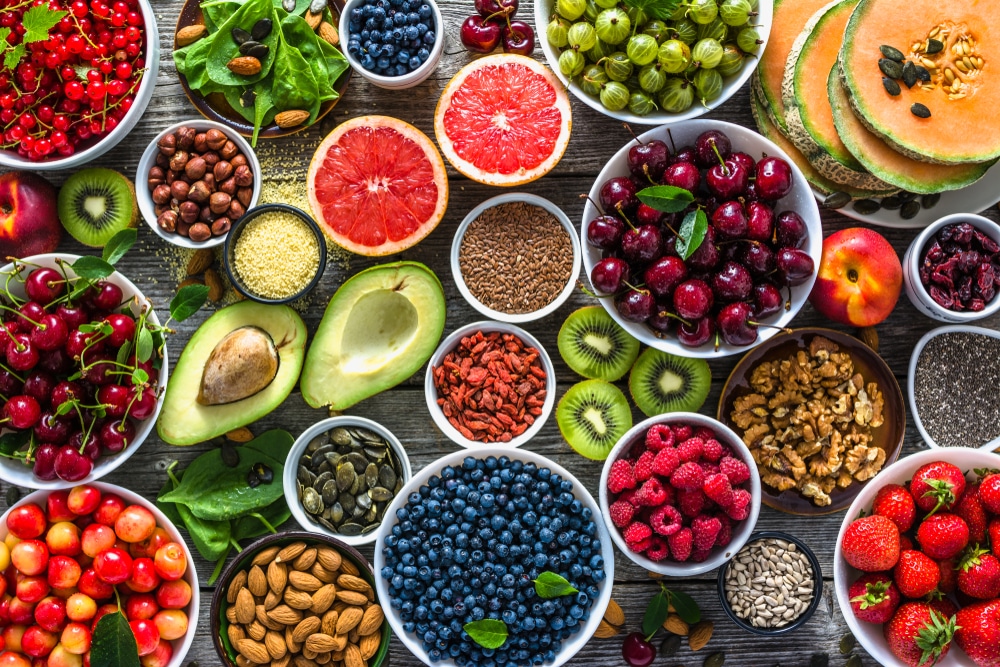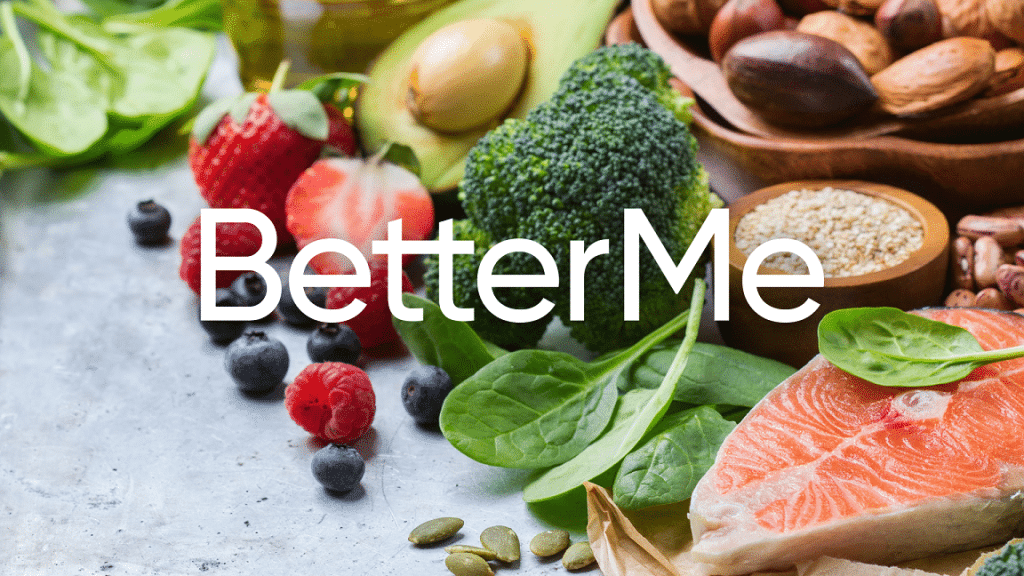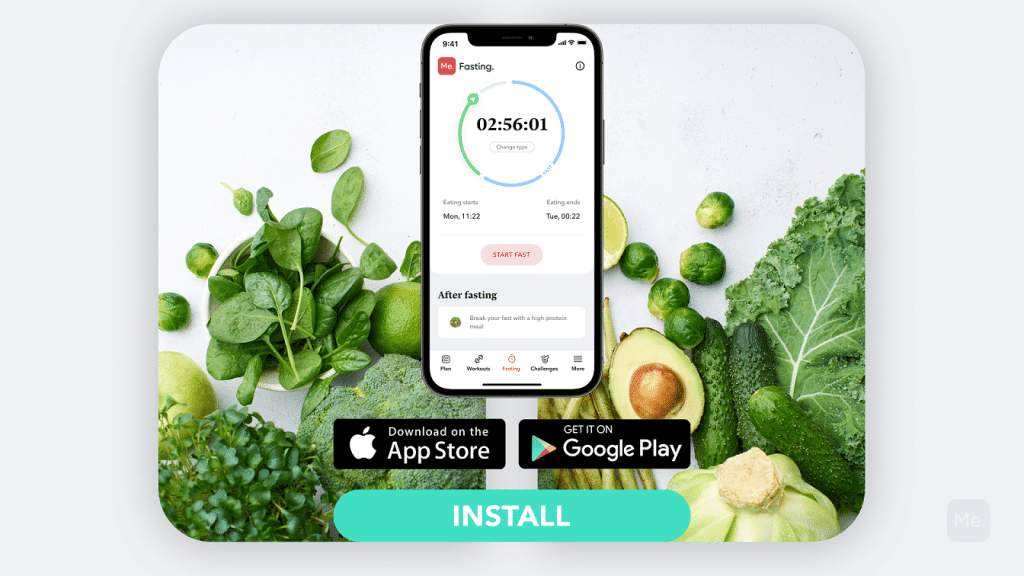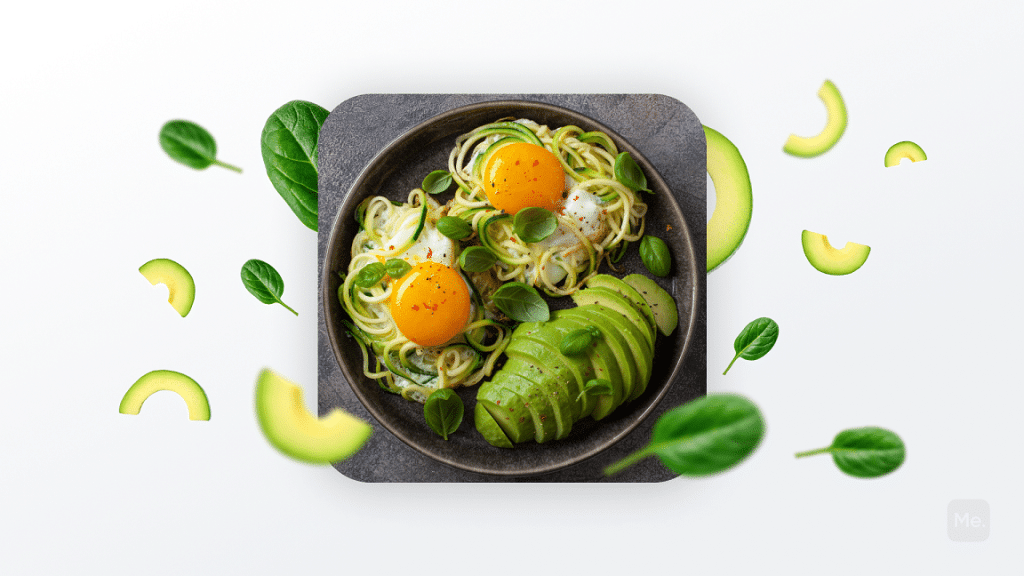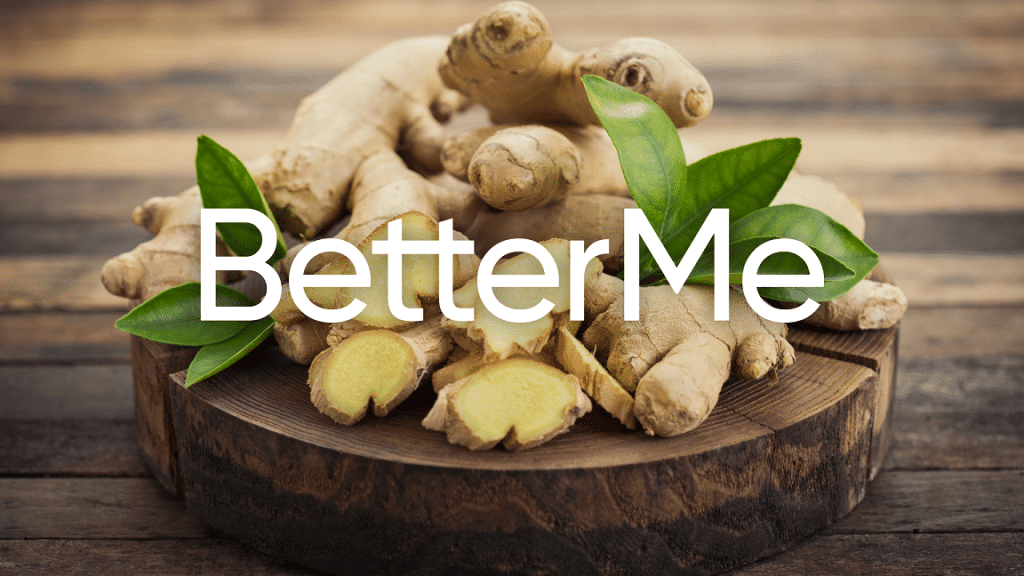About 70 million Americans are affected by digestive diseases. The human body is a complex structure. It is capable of performing many functions, all of which are important for good health. And given that you are what you eat, the gastrointestinal system plays a vital role in how food is digested and absorbed in the body.
Get your personalized
meal plan!
A healthy gut thus remains crucial in the proper digestion of food and nutrient absorption. The foods you eat therefore have an essential role in how your digestive system functions. But which foods help promote good gut health? We take a closer look at the top digestive superfoods.
What Are Digestive Superfoods?
The digestive system is responsible for the breakdown of food into small molecules absorbed by the body. The food we consume contains nutrients essential for life-sustaining functions such as the provision of energy, growth, and tissue repair.
The digestive system consists of the alimentary canal that runs from the mouth to the anus and includes the esophagus, stomach, the large and small intestines. It also contains accessory glands: the teeth, tongue, pancreas, salivary glands, liver, and gallbladder. Digestion involves a series of processes that begins soon after the ingestion of food and ends with excretion.
Digestive diseases refer to conditions that affect the GIT and range from Irritable Bowel Syndrome to peptic ulcers to the occasional stomach upset. They also include life-threatening diseases such as gastrointestinal cancers, hepatitis, or cirrhosis.
Overeating or eating some types of foods may cause digestion issues. For instance, if you are lactose intolerant, taking milk with lactose may cause pain. Also, eating foods with little to no fiber and not taking adequate amounts of water may result in constipation. There are, however, foods that promote good gut health.
Digestive superfoods, which are mainly plant-based, refer to nutrient-dense foods and help promote gut health. Nutrient-dense foods are rich in vitamins, nutrients, and antioxidants and are overall beneficial to one’s health.
Read More: Top 10 Superfoods To Boost Your Healthy Diet
The Top 10 Digestive Superfoods
Digestive superfoods help with digestion by promoting healthy gut bacteria, easing bowel movements, decreasing GI transmit time, and improving muscle contractions along the gastrointestinal tract. Generally, a diet rich in fiber and low in fat helps with digestion. Much as fiber is not digested, it absorbs water, increases stool weight and water content, and stimulates peristalsis (5).
An ideal diet should therefore be rich in fiber and low in saturated fat. Recommended foods include low-fat milk, poultry, lean meat, beans, peas, eggs, nuts, fruits, vegetables, and whole grains. So, what are the best digestive superfoods? Below is a comprehensive look at the best superfoods for digestive health.
Sauerkraut
Sauerkraut is simply fermented cabbage. It is first among our top 3 digestive superfoods. Compared to fresh cabbage, sauerkraut is more nutritious because of fermentation. Fermentation converts the natural sugars in the fresh cabbage into organic acids, mainly lactic acid.
Sauerkraut has a sour taste and long shelf life because of the lactic acid. Fermentation of fresh cabbage creates conditions that promote the growth of probiotics, such as those found in yogurt (11). A gram of sauerkraut contains about 1,000 to 100 million CFUs (4).
The probiotics in sauerkraut are good bacteria that help in digestion and prevent the overgrowth of harmful bacteria. Research indicates that probiotics may help reduce bloating, gas, diarrhea, constipation, and symptoms associated with ulcerative colitis and Crohn’s.
Looking for a way to break the vicious cycle of weight loss and tone up all the jiggly parts? Watch the extra pounds fly off and your muscles firm up with the BetterMe app!
Leafy Green Vegetables
Leafy green vegetables are an excellent source of calcium, folate, vitamin A, vitamin K, and vitamin C. Dark green vegetables are also rich in insoluble fiber, increasing the water stool content and adding bulk to stool, consequently stimulating peristalsis and mucus secretion (5).
Green vegetables such as kale, spinach, lettuce watercress, and collard greens are excellent magnesium sources. Magnesium may aid relieve constipation by improving muscle contractions within the gastrointestinal tract. Research shows that reduced dietary fibre intake, magnesium, and water increases the risk of constipation (1).
Sulfoquinovose, a sugar found in green vegetables, is a favorite of gut microbes (15). The good bacteria in the gut feed on this carbohydrate and reproduce. The higher the number of good bacteria in your GIT, the less likely less desirable bacteria are to reproduce and colonize your gut and cause illnesses.
Kefir
Next on our list of digestive superfoods is Kefir. Kefir is a drink made by adding kefir seeds to milk and fermenting it. Goat and cow milk is mostly used. But if you want a no dairy option, you can use coconut milk. Kefir is a powerful probiotic.
Its high probiotic content makes it an ideal digestive superfood. Kefir grains contain 61 variants of yeasts and bacteria (17). It is considered the best source of probiotics when compared to other fermented dairy products, nutrient-dense foods, including yogurt.
Probiotics increase the number of good bacteria in the gut. The friendly bacteria help prevent the overgrowth of harmful bacteria and protect against pathogens. Kefir has been linked to the increase in species of beneficial microbes such as Bifidobacterium and Lactobacillus. Also, the drink is associated with a decrease in harmful bacteria like Clostridium perfringens (17).
Avocado
Avocado is considered a superfood as it is an excellent source of dietary fiber and healthy fats.
Avocado is also a great source of fiber and contains about 7 grams of fiber per 100 grams (2). The recommended daily fiber intake is about 19 to 38 grams and is dependent on age and sex (3). Many individuals do not meet the minimum daily intake.
Adequate intake of fiber keeps the digestive tract healthy by keeping gut movements regular. A fiber-rich diet also makes good gut bacteria thrive. Adding avocado to your diet is a great way to increase fiber intake. This fruit contains a lot of fat, so make sure to eat them in moderation.
This fruit is low in fructose and thus less likely to cause gas. It also contains potassium that is vital for healthy digestive system function. Potassium helps the brain send signals to the muscles in your GIT and stimulates contractions. These muscle contractions help move food through the alimentary canal smoothly so that it can be digested (10).
Read More: How To Eat Avocado For Weight Loss: Eating Fat To Burn Fat
Yogurt
We all know of yogurt as a good source of protein. But some types of yogurt are also a good source of probiotics (good bacteria). The gut contains about 1000 types of bacterial species. The normal gut microbiota helps protect against pathogens, maintain the mucosal barrier’s integrity, and play a role in host nutrient metabolism (13).
The probiotics in yogurt help promote gut health. Some types of probiotics found in yogurt, such as Lactobacillus, have been shown to reduce the symptoms of irritable bowel syndrome (12). Yogurt containing bacteria such as Streptococcus thermophilus which improve lactose digestion and help lessen the symptoms of lactose intolerance (16).
Remember, not all types of yogurt contain probiotics. So when you are buying your yogurt, check for labels such as live or active culture.
Kombucha
Kombucha is fermented tea and is believed to have originated from ancient China. It may be referred to as kombucha tea or tea mushroom. It is prepared by adding a symbiotic culture of bacteria commonly known as ‘mushroom’ to sugared tea then letting it ferment.
This tea is popular because of its health benefits, including helping manage type II diabetes and promoting gut health. Just like other fermented products, kombucha is a good source of probiotics. The fermentation process also produces lactic acid, acetic acid, gluconic acid, and small amounts of alcohol (19).
Kombucha contains several species of Lactobacillus that may have a probiotic function (14). Probiotics supply your gut with friendly bacteria. These bacteria help with digestion and fight off harmful bacteria.
Black Beans
Black beans are very nutritious and are a good source of protein, fiber, vitamins, folate, iron, and antioxidants. So because of the high fiber content, black beans help prevent constipation. Additionally, black beans contain an antioxidant known as flavonoids known to have anti-inflammatory properties and help prevent certain types of cancers (9).
Black beans also contain fermentable carbohydrates and phenolic substances that modify the colonic microenvironment. They increase the number of good bacteria and promote colon barrier function and integrity (8). This may help prevent gut-related diseases.
Ginger
In traditional Asia, ginger is used to treat stomach aches and nausea. Not only is ginger a great spice, but also a great digestive superfood. Ginger is a carminative herb.
Ginger helps reduce flatulence and bloating. It is very effective against nausea. Just 1.5 grams of this plant should help with nausea, be it morning sickness or nausea after surgery. It helps with digestion as it promotes the secretion of acids.
Research shows that consuming ginger accelerates stomach emptying. This is beneficial for people with indigestion and belly discomfort. Ginger reduces pressure on the lower esophageal sphincter, prevents dyspepsia (indigestion), and reduces abdominal pain (6).
Beetroot
Beets are a common root vegetable that is both nutritious and delicious. They are rich in vitamin A, vitamin C, vitamin B6, magnesium, calcium, iron, and phosphorus. Whichever way it is prepared, beetroots have many health benefits.
Beetroots are rich in fiber, with a cup containing about 3.4 grams of fiber. The body does not hydrolyze fiber, so it bypasses digestion and goes straight to the colon. Adequate consumption of fiber helps prevent constipation. Fiber adds fecal bulk and stool water content.
This helps promote gut health and prevent conditions such as gastroesophageal reflux disease (GERD), irritable bowel syndrome (IBS), and diverticular disease. In addition, increased intake of fiber has been linked to a lowered risk of heart disease and colon cancer (7).
Beets are one of the best sources of glutamine which is the most abundant amino acid. Glutamine is a major substrate used by intestinal cells, with 30% of the intestine’s total glutamine. This amino acid helps maintain the integrity of the intestinal tissue barrier.
Inflammation can be related to multiple intestinal diseases such as colorectal cancer, ulcerative colitis, and Crohn’s. Research indicates that glutamine contains anti-inflammatory properties as it influences several inflammatory signaling pathways. Additionally, glutamine protects intestinal cells from cellular stress and has an anti-apoptotic property (18).
If you tend to let yourself off the hook, raise the white flag when things get tougher than you expected, send yourself on an unconscious binge-eating trip – BetterMe app is here to help you leave all of these sabotaging habits in the past!
Bone Broth
Last on our digestive superfoods list is bone broth. It is made from boiling bones and connective tissues of animals such as goats or cows in water. You can prepare bone broth from about any animal – be it beef, lamb, mutton, turkey, bison, fish, pork, or chicken.
Bone broth is a powerhouse of vitamins and minerals. It is easily digested and is good for the digestive system. Bone broth contains gelatin, which is a biopolymer with properties such as water solubility and adhesiveness.
Gelatin easily attracts and holds fluids. It can also bind to water in the gastrointestinal tract helping foods move more smoothly along the gut. It also promotes healthy bowel movements. Bone broth is rich in amino acids that help prevent inflammation.
Additionally, gelatin contains glutamine, an amino acid that helps improve the integrity of the intestinal barrier preventing a condition referred to as leaky gut (18). Bone broth is rich in glycine that helps stimulate stomach acid production, protects against stomach ulcers, and prevents the overgrowth of harmful microbes.
Drinking bone broth daily couldbe beneficial to people with irritable bowel syndrome (IBS), inflammatory bowel diseases (IBD), or a leaky gut. It is also an easy and affordable way of ensuring proper gut health. There are plenty of recipes around the web, you just have to pick your favorite one.
What Does A Healthy Gut Look Like?
Your overall health depends to a great extent on the health of your digestive system. The digestive system is responsible for how food is digested and later absorbed into the bloodstream to provide vitamins, minerals, and antioxidants essential for life-sustaining functions. This makes the digestive system crucial.
To have a healthy gut, you need to know the characteristics of both a healthy and unhealthy gut. Your gut is functioning properly when you have one to two stools a day that is easy to pass. Daily bowel movements shouldn’t be constipation or watery and loose stools.
So, how can you be able to tell that your gut is properly working?
Here are the indicators of a healthy gut:
Gut Wall Integrity
A Healthy gut wall is characterized by tight junctions that bind surrounding cells together to form an impenetrable barrier. Disruption of the barrier integrity may lead to loss of immune tolerance to gut microbiota and cause an inflammatory response.
Healthy Gut Microbes
More than 500 species of bacteria thrive within the gut. These play an important role in digestive system health, such as helping maintain GI motility, protecting against gut injury, and synthesizing vitamins such as K2, B12, and others.
Sufficient Gastric Acid
Stomach acid is highly acidic with a pH of 1 to 2. It is produced by the stomach’s lining and breaks down food for easier digestion. Too much stomach acid may cause abdominal discomfort, heartburn, bloating, or vomiting.
Healthy Mucus Layer
A thick layer of mucus lines the gut wall. It consists of immune cells, gut microbiota, and enzymes, which prevent the entry of protein and prevent the gastrointestinal tract from digesting itself.
On the other hand, an unhealthy gut is associated with several symptoms, including:
Abdominal Discomfort
Presence of symptoms such as abdominal pain, constipation, bloating, and gas are all signs of an unhealthy gut. A healthy GI tract will have little problems digesting food and eliminating waste products.
Food Intolerance
These are caused by difficulty digesting certain foods. It is important to note that food intolerance is different from food allergies resulting from immune system reactions to certain food types.
The cause is believed to be the poor quality of gut microbes, leading to difficulty digesting certain food types. It may also cause abdominal symptoms such as cramping, nausea, vomiting, and bloating.
Fatigue
An unhealthy gut may result in sleep disturbances such as poor sleep or insomnia, which causes fatigue. Most of the body’s serotonin, the stress hormone, is produced in the gut. So damage to your gut might affect your ability to get sufficient quality sleep.
Unintentional Weight Changes
Gaining or losing weight without making any adjustments to your diet or exercising may be an indicator of an unhealthy gut. An impaired gut can affect the body’s ability to absorb nutrients, store fats, and regulate blood sugar levels. Weight gain might result from insulin intolerance, or the constant urge to eat while losing weight may be caused by small intestinal bacterial overgrowth (SIBO).
Conclusion
The digestive system functioning is as fascinating as it is important. To be healthy, you need to have an efficiently working digestive system. So, it is essential that you eat a healthy balanced diet comprising whole, unprocessed foods and take lots of water.
Digestive superfoods could help promote a healthy gut and, reactions by extension, optimize your health. These superfoods are rich in vitamins, antioxidants, and fiber. If you have any questions concerning a superfood diet, reach out to your doctor or a dietitian.
DISCLAIMER:
This article is intended for general informational purposes only and does not address individual circumstances. It is not a substitute for professional advice or help and should not be relied on to make decisions of any kind. Any action you take upon the information presented in this article is strictly at your own risk and responsibility!
SOURCES:
- Association between dietary fiber, water and magnesium intake and functional constipation among young Japanese women – (2007, pubmed.ncbi.nlm.nih.gov)
- Avocado, raw (2020, usda.gov)
- Closing America’s Fiber Intake Gap (2016, ncbi.nlm.nih.gov)
- Fermented Foods as a Dietary Source of Live Organisms (2018, ncbi.nlm.nih.gov)
- Gastrointestinal Transit Time, Glucose Homeostasis and Metabolic Health: Modulation by Dietary Fibers – (2018,ncbi.nlm.nih.gov)
- Ginger in gastrointestinal disorders: A systematic review of clinical trials (2018, ncbi.nlm.nih.gov)
- Health effects of dietary fiber (2014, pubmed.ncbi.nlm.nih.gov)
- Navy and black bean supplementation primes the colonic mucosal microenvironment to improve gut health (2017, pubmed.ncbi.nlm.nih.gov)
- Polyphenol-Rich Dry Common Beans (Phaseolus vulgaris L.) and Their Health Benefits (2017, ncbi.nlm.nih.gov)
- Potassium channels in gastrointestinal smooth muscle (2000, pubmed.ncbi.nlm.nih.gov)
- Prebiotics and Probiotics in Digestive Health (2018, ncbi.nlm.nih.gov)
- Probiotic Therapy for Irritable Bowel Syndrome (2010, ncbi.nlm.nih.gov)
- Role of the gut microbiota in health and chronic gastrointestinal disease: understanding a hidden metabolic organ (2013, ncbi.nlm.nih.gov)
- Sequence-based analysis of the bacterial and fungal compositions of multiple kombucha (tea fungus) samples (2014, pubmed.ncbi.nlm.nih.gov)
- Sulfoquinovose is a select nutrient of prominent bacteria and a source of hydrogen sulfide in the human gut (2021, nature.com)
- Survival of Yogurt Bacteria in the Human Gut (2006, ncbi.nlm.nih.gov)
- The Microbiota and Health Promoting Characteristics of the Fermented Beverage Kefir (2016, ncbi.nlm.nih.gov)
- The Roles of Glutamine in the Intestine and Its Implication in Intestinal Diseases (2017, ncbi.nlm.nih.gov)
- The yeast spectrum of the ‘tea fungus Kombucha’ (1995, pubmed.ncbi.nlm.nih.gov)
